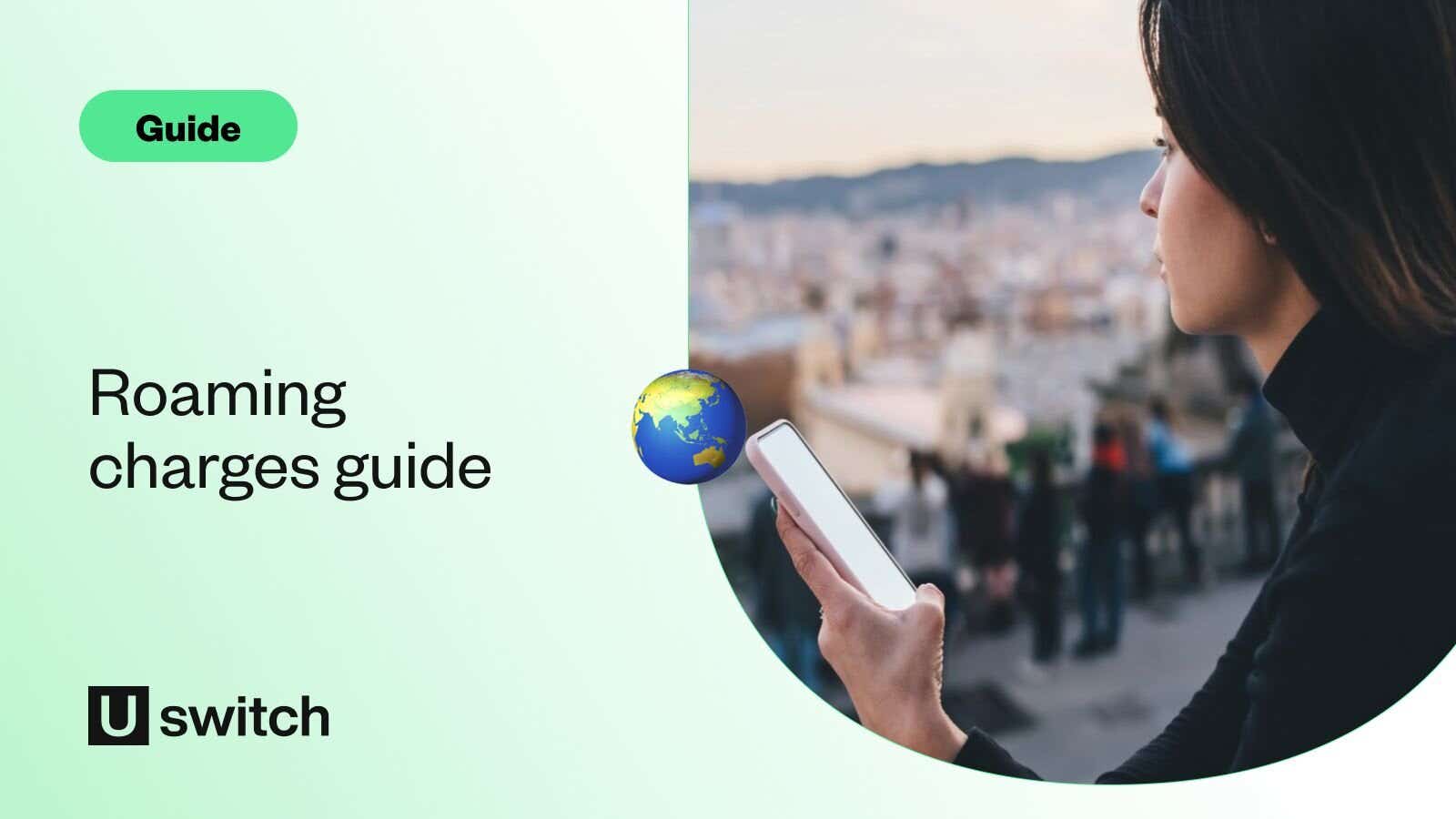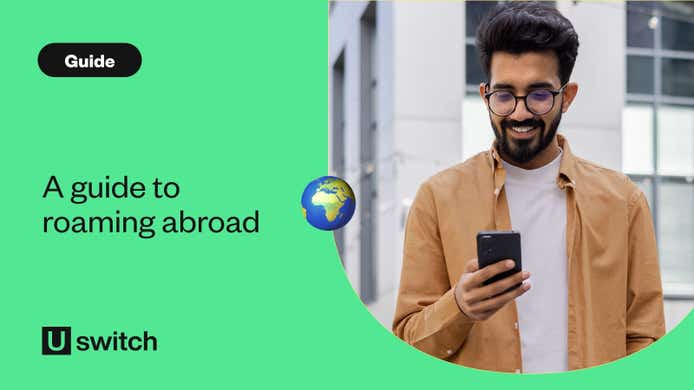What is data roaming?
Data roaming is when you access your mobile phone data outside of the UK. In addition to making calls and sending texts, your mobile will connect to the local mobile network in order to access the internet.
If you're overseas and not connected to Wi-Fi, you'll need to have data roaming switched on if you want to text your family back home, use Google Maps, post on social media or do anything else that requires data.
While data roaming is typically available in every country, some international networks charge more for their services than others. Our advice is to be cautious when using data roaming and, if it isn't already included in your monthly mobile plan, use it as sparingly as possible to avoid hefty charges.
How to switch on or switch off data roaming on Android phones
To switch on data roaming for Android smartphones, open the Settings app, tap Connections and then Mobile Networks. There should be a toggle switch at the top of the page that says ‘Mobile data’. Tap that to turn it on, and you'll be able to use mobile internet services in other countries.
How to switch on or switch off data roaming on iPhones
To turn on data roaming on your iPhone, go to the Settings app, tap on Mobile Data, tap on Mobile Data Options, and toggle the option labelled ‘Data Roaming’. With it switched on, you’ll be able to use all your favourite apps while travelling.

Should I just turn data roaming off?
As a general rule of thumb, having data roaming turned on at all times is a good idea, as it has advantages even if you're just at home. Roaming allows your phone to jump onto other networks even within the UK, which is particularly useful if you're in locations that don't have a great 4G or 5G signal.
If you’re travelling and you don't have roaming included in your plan (or the roaming charges for the location are more than you want to pay), instead of turning off data roaming, it's probably easier to simply turn off your phone's data altogether and just use local Wi-Fi wherever you can find it.
Roaming charges explained
There are different types of roaming charges to be aware of while travelling. When outside the UK, you can be charged either a daily rate for using your phone abroad or a charge per MB of mobile data used. In some cases, you could be charged both, as higher roaming charges still apply if you go beyond your monthly usage allowance
You could also get hit with mobile roaming charges if you use more data than what’s called the ‘fair usage policy’. This is essentially a cap on your data allowance that your network imposes while you’re outside the UK, and the limit could be less than what you’d get at home. You could quickly rack up a big bill if you’re not aware of the cap and exceed the lower limit.
We've detailed the networks' charges in their respective sections below. To be completely sure you don't get any unwanted surprise bills, we recommend checking with your network before you set off on your travels to find out what its current roaming policy is, and to see if there are any roaming charges for your specific destination.
“Roaming with your smartphone can be a costly exercise unless you keep tabs on data costs at your holiday destination, and your settings when you get there. Check with your network operator to find out about any roaming charges you might receive when travelling in the EU, now we're in a post-Brexit world. Outside of the EU can also have unique charges, so make sure you're aware before you go.
Lastly, turning off data roaming can be a last-ditch effort to curb costs, make sure to take advantage of local SIMs or free (and secure) Wi-Fi where you go.”
Roaming in the EU
Some UK networks, such as O2, Giffgaff, and Lebara, still include EU roaming in their pay-monthly and pay-as-you-go deals.
However, many now charge a daily rate for using their phones in some EU countries, as well as additional charges if they exceed their set allowance of calls, texts, or data.
Roaming in Ireland
As a UK resident, you may wonder about your network’s stance on roaming in Ireland.
While Northern Ireland is part of the UK (so roaming there is automatically free, as technically, you’re not even roaming), the Republic of Ireland is not. However, due to its close proximity and relationship to NI and the UK, all UK networks currently allow for free roaming in the RoI.
For Republic of Ireland citizens, the three main RoI networks have pledged not to charge roaming fees to users travelling anywhere in the UK, including NI. However, it's best to check with your provider before you head off because different roaming charges may apply depending on your network.
In fact, we’d recommend it for any roaming situation. Regardless of your price plan or the country you’re visiting, it’s always worth calling your network to clarify their policy before you jet off.
How did Brexit affect roaming charges?
Before Brexit, EU roaming regulations meant you could use your monthly allowances for calls, data, and texts while you were in 28 EU destinations at no extra charge.
Since 1 January 2021, the date that Brexit officially came into action, UK mobile phone users no longer receive free roaming in the EU by law. Major networks have either reintroduced roaming costs or pledged to keep roaming free for their customers.
Roaming outside the EU
Using your phone farther afield can come with costs, especially after the government added 20% VAT to roaming charges outside the EU. So you’ll have to pay a bit extra to call, text and surf the web on your phone. In some cases, you could even rack up bills well over £100 if you’re not careful.
Costs vary from country to country, but some popular destinations, such as the UAE and Morocco, are known to be particularly pricey.
Most networks offer add-ons and allowances, so find your provider below and see how their roaming plans match up to your holiday destination.
Alternatively, check out the latest travel eSIM deals and get a temporary pre-paid eSIM to use in whatever country you're travelling to. Travel eSIMs are typically cheaper than roaming add-ons and can be bought and set up in advance.
Check out our range of Travel eSIMs deals
Choose between dozens of travel eSIM data bundles on Uswitch.
Roaming charges in the US and Canada
Roaming in North America has always been more costly than roaming in the EU. Most networks require you to purchase an additional worldwide roaming package when you want to use your data and texts in these countries. However, a few networks still include worldwide roaming in their plans.
A Vodafone Xtra Plan, for example, can offer inclusive roaming in 83 worldwide destinations, including the US and Canada. However, not all Xtra plans have worldwide coverage, and those that do can be costly. Therefore, this plan is particularly suited to those who regularly travel outside the EU and use a lot of data while travelling. Canada and the US are classed as Zone C on Vodafone roaming plans, so make sure your plan includes Zones A, B and C, also called Global Roam, if you want to roam there.
You can also get USA roaming in deals from networks like Three, O2 and Sky Mobile. However, you might need to pay a daily charge to unlock your data while in the US.
Roaming charges in India
The best network for roaming in India is Lebara as all of its plans come with free roaming in India included. With plans starting from as little as £5, it's worth considering switching or getting a temporary SIM from Lebara if you're planning to travel to India.
Roaming in Turkey
Currently, Vodafone is the only UK network that offers roaming in Turkey as part of one of its packages. With its Global Roam plan, you can use data in Turkey up to its fair usage limit of 25GB.
With other networks, you can still use your phone while travelling to Turkey, but you'll have to pay additional charges. For example, Three customers can unlock their plan’s data, minutes and texts for £7 for every 24 hours or buy a 3, 7, or 14 day ‘Go Roam Around the World Extra Pass’ before travelling.
Roaming in Dubai (UAE)
You'll struggle to find a UK network that offers free roaming in the UAE. Most major UK networks have steep data roaming charges of £3 per MB or up to £6 per MB in some cases. This means you could spend £20 just to stream a video from YouTube in mere minutes. That’s why it’s best to see if your network offers a travel add-on.
Check to see if your network offers any add-ons for travelling to the UAE. Some networks like Sky Mobile have a Roaming Passport option that lets you use your data for a daily charge – in this case, £2 a day.
How to avoid roaming charges
Keep roaming charges to a minimum by following our traveller's tips.
1. Use free Wi-Fi whenever you can
Many hotels and café chains now offer wireless internet free of charge.
It’s worth noting, however, that some only offer the service free for a limited period, after which time charges apply.
You should also be aware that Wi-Fi coverage usually only extends to certain areas of a hotel, such as the lobby or a bar.
If you have roaming switched on, you could automatically be transferred to a local mobile phone network without warning.
2. Check if your network offers a roaming add-on
Most carriers now offer the chance to pay a little bit extra and get an add-on that will provide you with an allowance of data, texts and minutes to use abroad. If you pay for these, you’ll only pay the price of the add-on and won’t be liable for charges outside that.
If you’re not sure what your network offers for roaming add-ons, ring them, and they’ll be able to advise you.
3. Don’t opt out of your networks’ usage caps
After years of newspaper reports of bill shocks, all UK networks now enforce an automatic cap on data usage worldwide. This cap typically ranges between £40 and £49.
It’s easy to opt out. You just have to make a phone call. But we heartily recommend you don’t, or risk losing track of your spending and usage.
4. Consider buying a local SIM or eSIM
To lower the cost of calls and text messages, buy a local SIM card and top it up with pay-as-you-go credit.
To use a local SIM, though, you’ll need an unlocked handset.
5. Check whether your destination is bound by EU regulations
It might surprise you which countries aren’t bound to abide by EU usage caps. Turkey, Northern Cyprus, and Egypt are all popular destinations outside the EU.
Charges in Switzerland also vary on a network-to-network basis.
Which is cheaper, a prepaid SIM card or an international SIM card?
If your network doesn't offer roaming in the country you're travelling to, the best options are to get either an international SIM card or eSIM or buy a local prepaid or pay-as-you-go SIM card when you arrive.
Both have pros and cons, so the best option will depend on your situation.
International roaming SIMs are great if you're travelling to multiple countries or want to ensure you have a working mobile phone the second you arrive. This is helpful if you need to arrange transport from the airport or contact your hotel or tour operator when you arrive. It also means you'll have peace of mind that you'll have a working smartphone when you arrive without having to navigate any language barriers or shop around when you're potentially jet-lagged.
On the other hand, a local SIM will probably give you better rates on your calls and data. So, if you plan to be in one country for a longer period, then a local SIM could save you a lot in data charges.
If you're travelling in Europe, a local SIM is likely to give you free roaming across other EU countries, so you'll have the best of both options.
Check out Uswitch travel eSIM deals to compare a great range of data options for your chosen destination.
Should I keep data roaming on or off on my phone?
As a general rule of thumb, having data roaming turned on at all times is a good idea, as it has advantages even if you're just at home. Roaming allows your phone to jump onto other networks even within the UK, which is particularly useful if you're in locations that don't have a great 3G, 4G or 5G signal.
When travelling, if you don't have roaming included or the roaming charges for the location are more than you want to pay, it's probably easier to turn off your phone's data service altogether while you're there and just use Wi-Fi (if that's an option).
What is my network's roaming policy?
Since EU mobile roaming charges came back, keeping track of what’s what can be confusing. For some networks, you might only have to pay charges if you signed up after the specific date that charges were brought back.
Here’s a quick overview of some of the current roaming charges, updated for April 2025:
| Network roaming scheme | Who does it apply to? | Cost | Destinations covered | Fair usage (if data tariff above amount mentioned) |
|---|---|---|---|---|
| Three's Go Roam | All Advanced plans | £2 for Go Roam in Europe and £5 for Go Roam Around the World | 160 | 12GB. Can spend up to 2 months in roaming zone over 12 month rolling contract period |
| Vodafone Xtra Global Roam | All customers on new monthly plans | None | 51 | 25GB. Can spend up to 2 months in roaming zone over 4 month period |
| EE Roam Abroad Pass | Available to customers on plans taken on or after 7 July 2021 | £25 a month | 47 European destinations | 50GB fair usage allowance |
| O2 Europe Zone Usage and Travel Bolt On | All pay monthly plans (not PAYG) | £7 a day | 48 Europe Zone destinations, 75 destinations in other zones | 25GB for Europe Zone, 10GB for other zones. Can spend up to 60 days in roaming zone over 120-day period. |
| Tesco Mobile Home from Home | All customers on pay monthly or PAYG plans | None | 48 Europe Zone destinations + 6 | 12GB. Can spend up to 60 days in roaming zone over 120-day period |
| Sky Roaming Passport | All customers on pay monthly plans | £2 per day | Over 55 destinations, including most of the EU/EEA, the USA and Australia. | None |
| BT Roam Like at Home | All customers on pay monthly plans | None | 47 | 50GB. Can spend up to 60 days in roaming zone over 120-day period |
| iD Mobile Roam Like at Home | All customers on pay monthly plans | None | 50 | 30GB. Can spend up to 60 days in roaming zone over 120-day period. |
| SMARTY roaming | All customers | None | 35 | 12GB and cannot roam for more than 60 consecutive days at a time. |
Where can I use my allowances for no extra charge?
Some networks allow you to use your monthly allowances for no extra charge in EU and non-EU European locations, as well as in select locations further afield.
Roaming charges returned once Brexit came into effect. A few UK networks pledged that they wouldn’t bring roaming charges back for the EU. These networks are:
- O2
- giffgaff
- SMARTY
- Tesco Mobile
- Lebara
To see what your carrier offers and which locations they cover, head to our network-by-network breakdown:
Ultimately, it’s all about being aware and having the right information before you head off on your holidays.
What does fair usage mean?
Fair usage means networks can cap your roaming data allowance below what’s included in your standard allowance in the UK. This means that you could still rack up high data charges if you exceed the lower limit.
Some networks can also limit the number of days you spend in a certain location. If you access a foreign network for too many days, you could get hit with additional charges.
How does fair usage work in relation to roaming charges?
Confusingly, each network applies a slightly different fair usage policy, depending on your data allowance and the plan you’re signed up for.
Take, for example, O2’s pay-as-you-go Big Bundle. In the UK, you get a monthly allowance of 20GB. But under the fair use policy terms, this is actually capped at 10GB when you’re using your phone outside the EU. If you’re a Three customer, you’ll be charged extra if you go over 12GB. And EE’s fair use cap for all customers is 50GB.
There can also be different caps depending on whether you’re a pay monthly customer or a pay as you go customer. Logging into your account and checking the small print of your agreement is the only way to be sure whether your data usage is capped and by how much.
“The best tip for British holidaymakers is to do a little bit of research and preparation. Most networks now offer specific tariffs or add-ons to help prevent customers from losing out. So before travelling overseas, it is worth checking whether your destination is covered by your existing deal or if an add-on is available.
“In many cases, you will then be able to use your phone exactly as you would at home, but if you are in any doubt, ensure your data roaming is turned off on your handset. Data is where the real costs are often incurred, and quickly - though most networks do now operate caps to prevent bills spiralling out of control.
“If you have to roam while away, try to keep your phone usage to a minimum and, wherever possible, connect to the Wi-Fi at your hotel or any location you are at. Alternatively, if you must use your phone a lot when abroad, the most cost-effective option is usually to buy a local SIM.”
Can my mobile network provider change their data roaming charges at any time?
If your provider is planning to change its data roaming charges it will notify you at least 30 days in advance. So make sure to always check whatever emails you get from your network so you don't get stung with higher charges.
Do calls to the EU from the UK count as data roaming?
Calls to the EU from the UK are international calls and don't count as data roaming. Data roaming is when you use your UK phone in another country.
How can I find out how much my mobile provider charges for roaming?
You can find out how much your mobile provider charges for roaming on its website, or check our 'Best network for international roaming' guide.
What is the difference between mobile data and data roaming?
Your mobile phone uses mobile data when accessing internet services such as social media apps, Google, maps, etc. Data roaming is when you use these internet services in another country and your phone needs to use a different network to access the internet.




